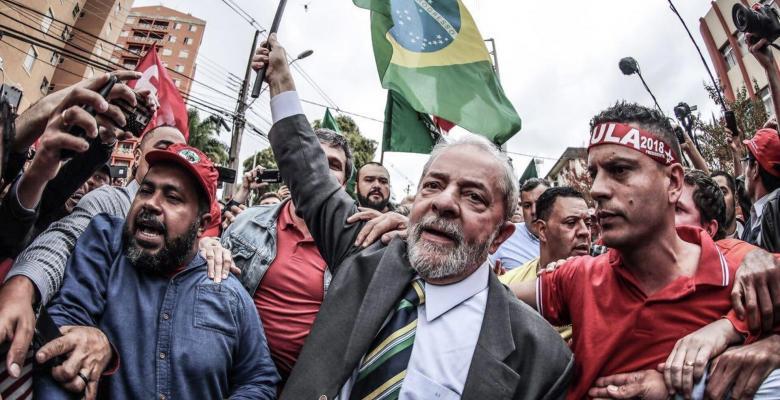Lula and the necessary political commitment
especiales

With less than ten months of holding the presidency of Brazil, Luiz Inacio Lula da Silva continues to be a leader that gives hope to the majority of Brazilians, despite the fact that now, as never before, spurious interests conspire against him.
And it is happening from different scenarios, such as those controlled by Bolsonaro followers, protagonists in the assault on the headquarters of the three powers in January 2023, soldiers who fear losing the privileges they acquired with the former president, a justice that does not fulfill its main goal and individuals disguised as religious people, who aim to exploit ignorance.
Despite the threat posed by the prior elements, perhaps the greatest threat comes from an antagonistic Congress, which gives weapons to the right to overthrow or freeze Lula's main proposals.
Without a doubt, it is a challenge to governability, which also arises when it comes to articulating a government project with mayors, governors and Bolsonaro congressmen who continue to bet on far-right discursive logics with which it is very difficult to negotiate.
In the case of Congress, the situation presents a particularly difficult scenario for the new national administration. On October 30, 2022, in addition to holding the first round of the presidential elections, Brazil renewed the 513 members of the Chamber of Deputies and a third of the seats in the Senate. The Bolsonarist Liberal Party (PL) held a historic legislative election, managing to consolidate a bench of 99 deputies and acquiring control of the Senate for the first time in 25 years.
The potential threat for Lula's administration lies in the fact that the Workers' Party, even counting the votes of allied political groups in the organization, does not gather the 180 votes necessary to stop an impeachment trial. And even if it did, the PL has enough power to turn the impeachment process into a real hindrance to Lula's management.
The best example, due to regional and temporal proximity, is what happened in Peru with the dismissal of Pedro Castillo last December. The approval of the vacancy motion that dismissed Castillo was based on an abuse of power exercised by the then president when trying to dissolve Congress.
However, prior to that, the opposition led two impeachment attempts, alleging a far-fetched justification based on an ambiguous constitutional term. If the Liberal Party of Brazil focuses its efforts on boycotting the Workers’ Party government, the possibilities of achieving the agenda that Lula has proposed are considerably reduced.
A HEAVY BURDEN
Many of the children who left hunger behind during Lula's first two terms are young people of legal age who attended the polls and voted with memory. Also with an empty stomach, because Brazil is going through a hunger epidemic. According to a study developed by the Brazilian Research Network on Food Sovereignty and Security, more than half of the country's inhabitants suffer some type of food insecurity.
The report In Brazil, eating is an act of resistance, from The Brazilian Report, reveals that 36% of Brazilians lack the means to eat at least once a day. Josué de Castro, one of the leading theorists studying food insecurity in Brazil, describes hunger in the country as a “chronic disease” caused by the very high levels of wealth concentration and the lack of state policies aimed at ensuring fair redistribution.
In this context, Lula da Silva's government took power with a very heavy burden on its shoulders. The truth is that, although the two decades that have passed since the beginning of Lula's first term have not been in vain, nostalgia brings together great expectations on what this Lula’s third term can do to change the quality of life of the most impoverished population.
Lula, furthermore, did not hesitate to explicitly assume the eradication of hunger as the main goal of his government. “Our commitment is to end hunger again,” he said in his first speech in Sao Paulo after winning the presidential runoff against Bolsonaro.
With this, the President of Brazil joins his Colombian counterpart in the difficult task of living up to hope. While Gustavo Petro aims to achieve peace, Lula da Silva is committed to the eradication of hunger.
ACHIEVEMENTS AND CHALLENGES
Even the media that moves to the pace of the right-wing have recognized the achievements of Lula's third presidential term.
The Mais Medicos plan, the National Immunization Program, the Popular Pharmacy and the first stage of joint efforts to perform surgeries throughout the country are all part of this.
But the president has found serious obstacles in the Congress to carry out the necessary changes to benefit Brazilians.
Thus, measures are hindered to restore social justice, development, and the role it played in the international arena before his predecessor, Jair Bolsonaro, took office.
Other aspects of the social area towards which work has been done and which the legislature constantly obstructs are the fight against racial discrimination, the creation of the Ministry of Racial Equality, combatting violence against women and the defense of their rights, as well as well as the indigenous and LGTBI population, and the fight against organized crime.
Other obstacles in Congress conspire against a tax reform that corrects the historical distortions of a regressive and unfair tax system for Brazilians and federal entities.
Likewise, it conspires to prevent Lula from returning to the State important industries that have been privatized, resuming the works that have been stopped and the official plans to invest in infrastructure, which has six axes: transportation; social infrastructure; digital inclusion and connectivity; urban infrastructure; water for all and energy transition.
A deputy and leader of the Landless Movement, Joao Daniel, has demanded in Latitud Brasil, which is broadcasted on Telesur, the strong and necessary social mobilization to support Lula's plans, guaranteeing that these reactionary legislators really fear popular power, and thus prevent the parliamentary coup that deposed Dilma Rousseff.
Translated by Sergio A. Paneque Díaz / CubaSí Translation Staff













Add new comment